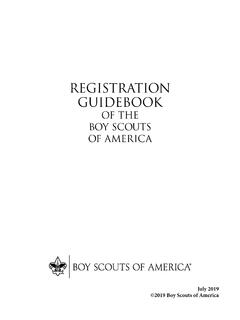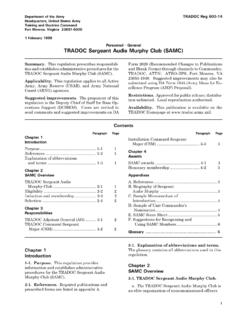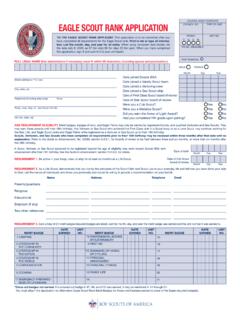Transcription of American Imperialism
1 To become a major naval power, the United States began to replace its wooden sailing ships with steel vessels powered by coal or oil in 1883. But control of the seas would also require the acquisition of naval bases and coaling stations. Germany's Kaiser Wilhelm had copies of Mahan's books placed on every ship in the German High Seas Fleet and the Japanese gov-ernment put translations in its im-perial bureaus. (continued at the top of page 2) By 1890, the United States had by far the world's most productive economy. American industry pro-duced twice as much as its closest competitor--Britain. But the United States was not a great military or diplomatic power. Its army num-bered less than 30,000 troops, and its navy had only about 10,000 men. Britain's army was five times the size of its American counterpart, and its navy was ten times bigger.
2 The United States' military was small because the country was situated between two large oceans and was surrounded by weak or friendly nations. It faced no serious military threats and had little inter-est in asserting military power overseas. From the Civil War until the 1890s, most Americans had little interest in territorial expansion. William Seward, the secretary of state under presidents Lincoln and Johnson, did envision American expansion into Alaska, Canada, Mexico, Cen-tral america , the Caribbean, Ice-land, Greenland, Hawaii, and other Pacific islands. But he witnessed only two small parts of this vision. In 1867, the United States purchased Alaska from Russia for $72 million and occupied the Midway Islands in the Pacific. Americans resisted expansion for two major reasons. One was that imperial rule seemed inconsistent with america 's political principles.
3 The other was that the United States was uninterested in acquir-ing people with different cultures, languages, and religions. But where an older generation of moralists thought that ruling a people without their consent violated a core principle of republican-ism, a younger genera-tion believed that the United States had a duty to uplift backward socie-ties. By the mid-1890s, a shift had taken place in American atti-tudes toward expan-sion that was sparked partly by a European scramble for empire. Between 1870 and 1900, the European powers seized 10 million square miles of territory in Africa and Asia, a fifth of the world's land mass. About 150 million people were subjected to colo-nial rule. In the United States, a growing number of policy makers, bankers, manu-facturers, and trade unions grew fearful that the country might be closed out in the struggle for global markets and raw materials.
4 A belief that the world's nations were engaged in a Darwinian struggle for survival and that countries that failed to compete were doomed to decline also con-tributed to a new boldness on the part of the United States. By the 1890s, the American economy was increasingly dependent on foreign trade. A quarter of the nation's farm prod-ucts and half its pe-troleum were sold overseas. Alfred Thayer Mahan, a naval strategist and the author of The Influ-ence of Sea Power Upon History, argued that national prosper-ity and power de-pended on control of the world's sea-lanes. "Whoever rules the waves rules the world," Mahan wrote. The United States Becomes a World Power (1890-1920) American Imperialism ENDURING UNDERSTANDING At the beginning of the 20th Century, competition for economic, political, and military power brought the United States into interna-tional conflict.
5 ESSENTIAL QUESTION x How did global com-petition motivate the United States to be-come a world power? x How did the exer-cise this new power? FORCES OF UNITY AND DISUNITY : Students understand the tensions between the forces of unity and those of disunity in various times in their local community, in the United States, and in various locations world wide. FOCUS QUESTIONS Should the become an Imperialist Power? What should our foreign policy (role) consist of to-day? US HISTORY During the late 19th century, the idea that the United States had a special mission to uplift "backward" people around the world also com-manded growing support. The mainstream Protestant religious groups established religion missions in Africa and Asia, including 500 missions in China by 1890. During the late 1880s, American foreign pol-icy makers began to display a new assertive-ness.
6 The United States came close to declaring war against Germany over Samoa in 1889; against Chile in 1891 over the treatment of sail-ors; and against Britain in 1895, over a territo-rial dispute between Venezuela and Britain. American involvement in the overthrow of Hawaii's monarchy in 1893 precipitated a momentous debate over the United States' global role. They debated whether the should behave like a great power and seize colonies or whether it should remain isolated. Should the Become an Imperialist Power? As the United States approached the end of the 1800s, Americans began to debate whether or not the country should continue to expand overseas. Some argued that gaining an over-seas empire would enable the United States to play a stronger role in world affairs. Others opposed becoming an imperialist power for both moral and realistic reasons.
7 There were four main schools of thought when it came to america s role towards Imperialism : 1. Henry Cabot Lodge: The must ex-pand to compete; 2. Carl Schurz: The should become a power for peace; 3. Josiah Strong: The should spread Anglo-Saxon civilization; and 4. Alfred T. Mahan: The must become a great sea power. Evaluate: What school and/or schools of thought do you agree with concerning Amer-ica s role towards Imperialism ? Do you agree with one or a combination of any four philoso-phies? In its dealings with other nations (the United States) should have scrupulous (careful) re-gard, not only for their rights, but also for their self-respect. With all its resources for war, it should be the great peace power of the world. It ( america ) should seek to influence mankind, not by heavy artillery, but by good example and wise counsel.
8 It should see its highest glory, not in battles won, but in wars prevented. It should be so invariably (always) just and fair, so trustworthy that other nations would instinc-tively turn to it as the great preserver of the world s peace. Some Americans saw Imperialism as funda-mentally un- American . They wondered how the United States could spread its democratic ideals abroad if it did not respect the rights of other nations. Anti-imperialist politician and re-former Carl Shurz acknowledged that the nation should defend its interests. But he also believed that foreign policy should promote peace, not conquest by stating: america Becomes a World Power (continued) Carl Schurz: The should become a power for peace!!! Henry Cabot Lodge: The must expand to compete!!! Small states are of the past and have no future.
9 The modern move-ment is all toward the concentra-tion of people and territory into great nations and large dominions (self-governing territories). The great nations are rapidly ab-sorbing for their future expansion and their present defense all the waste places of the earth. It is a movement which makes for civili-zation and advancement of the race. As one of the great nations of the world, the United States must not fall out of the line of march. Pointing to the European scramble for colonies, some Americans argued that from a practi-cal opinion, the United States must expand to compete economically. Their arguments often reflected a social Dar-winist emphasis on survival of the fittest. Henry Cabot Lodge, a powerful member of the Senate Committee on Foreign relations, strongly urged the country to join the imperial-ist club by stating: Page 2 American Imperialism Henry Cabot Lodge Carl Schurz Resources: Digital History Website and Don t Know Much About History by Kenneth C.
10 Davis Some Americans supported Imperialism from a moral rather than an economic opinion. They saw much of the world as living in dark-ness. It was the duty of the United States, in their view, to bring the light of freedom and Christianity to those dark places. Josiah Strong, a Christian missionary leader, was a leader of this group. In his influential book Our Country, Strong wrote that the United States had a divine mission to spread its Anglo-Saxon civili-zation around the world. When he used the term Anglo-Saxons, Strong was refer-ring to white English-speaking peoples. In his view, Anglo-Saxon civilization was superior to all others because it was founded on the twin ideas of civil liberty and Christianity. Strong once said, To be a Christian and an Anglo-Saxon and an American , is to stand at the very mountain top of privi-lege.






